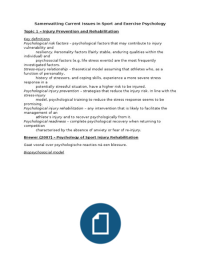Samenvatting Current Issues in Sport and Exercise Psychology
Topic 1 – Injury Prevention and Rehabilitation
Key definitions
Psychological risk factors – psychological factors that may contribute to injury
vulnerability and
resiliency. Personality factors (fairly stable, enduring qualities within the
individual) and
psychosocial factors (e.g. life stress events) are the most frequently
investigated factors.
Stress-injury relationship – theoretical model assuming that athletes who, as a
function of personality,
history of stressors, and coping skills, experience a more severe stress
response in a
potentially stressful situation, have a higher risk to be injured.
Psychological injury prevention – strategies that reduce the injury risk. In line with the
stress-injury
model, psychological training to reduce the stress response seems to be
promising.
Psychological injury rehabilitation – any intervention that is likely to facilitate the
management of an
athlete’s injury and to recover psychologically from it.
Psychological readiness – complete psychological recovery when returning to
competition
characterised by the absence of anxiety or fear of re-injury.
Brewer (2007) – Psychology of Sport Injury Rehabilitation
Gaat vooral over psychologische reacties ná een blessure.
Biopsychosocial model
,The model has seven key components: injury, sociodemographic factors, biological
factors, psychological factors, social and contextual factors, intermediate
biopsychological outcomes, and sport injury rehabilitation outcomes.
According to the model, injury (the occurrence of physical damage) initiates the sport
injury rehabilitation process. The type, cause, severity, location and history of injury
are thought to influence not only biological factors, but also psychological and social
and contextual factors.
Occupying a central role in the model, psychological factors are considered to have
reciprocal relationships with both biological factors and social/contextual factors.
This model does not articulate proposed relationships among specific psychological
factors.
Stage models
The key assumptions of stage models are that injury constitutes a loss of an aspect of
the self, and that psychological responses to sport injury follow a predictable
sequence. Athletes with injuries pass sequentially through stages of denial, anger,
bargaining, and depression before arriving at acceptance of their injuries. Research
has suggested that the way athletes react psychologically to injury is highly variable
across individuals and depends on a variety of factors, including personal
characteristics of the athletes and aspects of the situations in which injury and
rehabilitation occur.
, Cognitive appraisal models
Are a group of related conceptual frameworks that borrow heavily from stress and
coping theory and ascribe a central role to cognition in determining psychological
reactions to sport injury.
Integrated model holds that responses to injury are influenced by both preinjury
variables (i.e. personality, history of stressors, coping resources, interventions) and
postinjury variables. The way the injury and the rehabilitation process are interpreted
(or appraised) is thought to affect three interrelated parameters: emotional
responses, behavioural responses and recovery outcomes. Characteristics of the
person (i.e. injury attributes, individual differences variables) and the situation (i.e.
sport-related variables and aspects of the social and physical environment in which
rehabilitation is occurring) are posited to have direct effect on cognitive appraisals.
Distinction between situational variables and cognitive appraisal of the situation is
not always clear-cut, nor is the distinction between personal factors and situational
factors.




